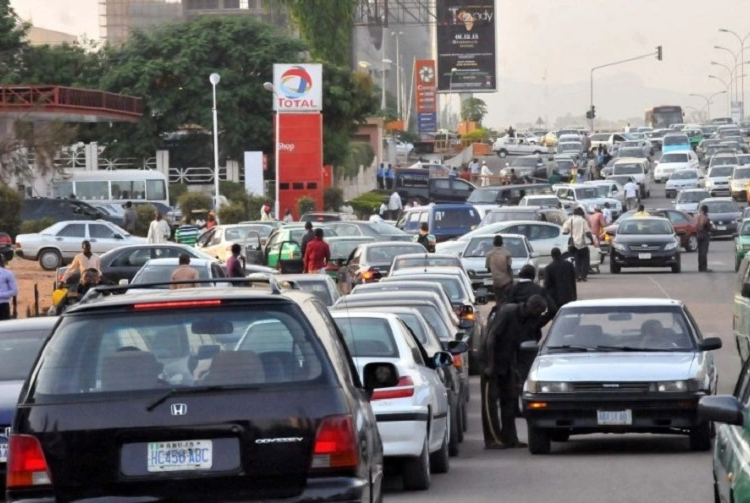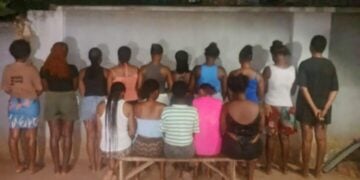Petroleum products marketers have said that only deregulation of the downstream oil industry will engender competition and address pump price inconsistencies and arbitrary hike and smuggling by a few operators in the industry.
This is as long fuel queues resurfaced at filling stations in the federal capital city of Abuja amid thriving black market sales.
Several fuel stations in Abuja yesterday were not dispensing the products, while the few dispensing caused serious traffic snarl-up due to long queues.
The marketers reacted to investigation by LEADERSHIP which revealed that petrol still sells close to N300 per litre in Lagos, outskirts of Abuja and other parts of the country even after the Nigerian National Petroleum Company Limited, NNPCL, acceded to the request of independent petroleum marketers for direct supply of products.
Before now, independent marketers sourced products from third party operators in the industry, while major marketers enjoyed credit facility and direct product supply from the NNPCL which they claimed was responsible for the wide gap in pump price in the market.
Although the Independent Petroleum Marketers Association of Nigeria, IPMAN, said there ought to be a uniform pricing structure after the NNPCL intervention, LEADERSHIP findings showed that some operators especially among the Independent marketers sell above the agreed pump price of between N185 and N210 depending on the region.
A visit to some of the filling stations at Lagos-Ibadan expressway revealed that some filling stations were selling above N185 per litre. One of such filling stations is Heyden, which is selling at N195 per litre.
Also, at Lekki free zone areas, the price of some marketers range from N200 to N250.
Only filling stations like Total, Mobile and NNPC, etc., are selling at the price of N185 per litre, a resident in that area, Mr Tony Agbejo, told LEADERSHIP, adding that others are selling as high as N250.
LEADERSHIP’s checks also showed that petroleum is sold at N298 per litre in many filling stations in Mararaba area of Nasarawa state, an adjoining town to Abuja.
“The reason we patronise them is that there is no queue. We just drive in and drive out. However, there is queue at the big filling stations like Total and Mobile that sell at N185 per litre,” Mr Agbejo stated.
In Maryland, Lagos, a newly opened outlet, TIMAC, boldly displayed its pump price: N230 per liter.
Major marketers operating at the Sango-Idiroko expressway are selling fuel at between N190 and N200 per litre.
Also, fuel queues have failed to disappear on these routes because the marketers prefer selling to smugglers who come with kegs and jerry cans to buy up Premium Motor Spirit (PMS), thereby making it difficult for other customers to get fuel.
Due to this act, customers spend hours on queue as the filling stations are mostly populated by smugglers who buy in large quantities for onward smuggling to neighboring Benin Republic.
At Abule-Egba area of Lagos, major marketers are complying with the new fuel pump price of N185 across Mobil, Total, ConOil, NNPC retail outlets, while most independent marketers are selling at between N195 and N200.
Reacting to the situation, national president of IPMAN, Elder Chinedu Okoronkwo, said those operators flouting the arrangement by contravening and defying the industry-wide agreement are working against the interest of the country and the public.
Okoronkwo, in a telephone chat with our correspondent, said, “I know we had an understanding with the NNPCL. After we approached them demanding for direct supply to independent marketers which they obliged, it will not serve the interest of the country for us to disappoint Nigerians. We made the NNPCL understand that the huge price differential was fueled by arbitrary ex-depot price as well as other associated costs. Now Lagos and Abuja have no reasons to sell above N185 per litre.”
LEADERSHIP gathered from sources that independent marketers receive products from NNPCL in Lagos at N172 per litre and, after associated costs to land it at outlets, should sell at N185 per litre.
In Port Harcourt, NNPCL sells to marketers at N188 a litre while outlets are allowed to sell at between N200 and N210 per litre. The same situation should be replicated in the South East and North East due to logistics challenges.
Okoronkwo confirmed the findings, saying it is outrageous to sell above those prices based on current distribution arrangements.
However, the Petroleum Products Retail Outlets Owners Association of Nigeria (PETROAN) said the group has ensured strict compliance to open market operations and has been carrying out surveillance across the country to ensure its members do not engage in hoarding or smuggling of products.
National president of the association, Dr Billy Gillis-Harry, told our correspondent that because of associated costs and different operating environments, prices tend to differ.
“What we have ensured is that our members operate regularly to ensure even distribution of products nationwide. But let me add, we are credit marketers who source funds from financial institutions with huge interests, and sourcing and receiving products are not coming immediately. You stay days to take possession and land products at outlets which extends time of loan repay, so marketers would adjust in this case to realise and repay money borrowed.
“Yes the NNPCL is selling to us at newly agreed pump price and directly also, but it doesn’t come immediately because after raising money, you wait for allocation and all these adds to cost of fund and operations,” he said.
Tinubu’s Outburst Over Fuel Scarcity, Others Confirms APC’s Failure
According to Gillis-Harry, the association is making enormous sacrifices to ensure it supports NNPCL to provide services but that the adjusted pump price differences is to make them remain in business.
FCT Motorists Groan Over Scarcity
Meanwhile, many motorists in the Federal Capital Territory (FCT) have been groaning over current fuel crisis and continuous queues at fuel stations.
The motorists also expressed displeasure over the scarcity of cash in the country, which they said is compounding the issue, and appealed to the federal government to intervene swiftly.
The NNPCL had attributed the fuel queues in Abuja and some parts of the country to restriction on businesses and movement during the presidential and National Assembly elections.
The NNPCL said operations had resumed at the depots and trucks were being dispatched to various parts of the country.
A motorist, Mr Aloysius Osita, said that the resurfacing of fuel scarcity is adding to the residents’ hardship.
“I thought that the issue of fuel scarcity had been addressed finally, but I was surprised to see queues everywhere. It has worsened the situation, in view of queuing for fuel and Point of Sale (POS) payment at the same time.
“After queuing for fuel, you will also queue for POS, which may decline and alter the fuel purchase”, he added.
Another motorist, Mr Gbemi Olugbenga, expressed concern over the unavailability of the product and urged the regulatory authority to hasten products distribution to cushion the effect.
“Sometimes, some fuel stations are taken over by touts who usually hijack the fuel station’s management, causing more hardship and traffic for other commuters”, Olugbenga said.
Some of the residents also lamented the lack of fuel to power their generators for businesses and domestic use.
Black marketers were also seen making brisk sales, selling 10 litres of petrol at N5,000 through electronic transfer or POS payment and N4,000 for cash payment.
One of the black market sellers said they had been facing difficulties in getting fuel from the stations, adding that most of them insist on cash payment instead of electronic transfers.
The Nigerian Midstream and Downstream Petroleum Regulatory Authority (NMDPRA), it would be recalled, had said that it was working with other stakeholders to mitigate the difficulties being experienced in the distribution of fuel.





